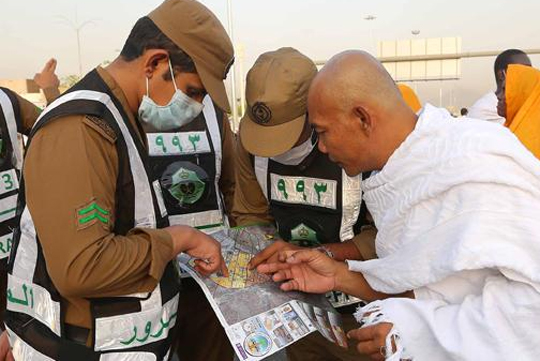
Jeddah, Oct 8: Custodian of the Two Holy Mosques King Abdullah has commended the efforts of government agencies and private organizations in making this year’s Haj a "big success," enabling more than 2 million Hajis to perform their rituals in peace and comfort.
“We appreciate the efforts of your royal highness and the Supreme Haj Committee as well as security officers and employees of public and private agencies in making the Haj operation a big success,” the king said in a cable to Interior Minister Prince Mohammed bin Naif, chairman of the committee.
King Abdullah thanked the Almighty for His blessings and praised all officials and employees of Haj-related organizations for doing their jobs responsibly. “This has resulted in them efficiently carrying out the various plans related to Haj security, health services, traffic and pilgrim safety,” the king said.
King Abdullah underscored the coordinated efforts that allowed pilgrims to move smoothly to the tent city of Mina, Mount Arafat for the standing in prayer ritual, before moving to Muzdalifah and then Mina for the stoning of the Jamrat, without any major incidents.
“We thank God for protecting the health of pilgrims from infectious diseases,” the king said while praising the precautionary measures taken by the Health Ministry. He reiterated Saudi Arabia’s readiness to extend the best possible services to the guests of God.
Prince Mohammed had sent a message to King Abdullah congratulating him on the successful completion of the pilgrimage. He said over 2 million faithful, which included 1.4 million foreign Hajis, stood at Arafat on Friday. “There was uninterrupted water and electricity supply,” he said while praising municipal workers for cleaning Makkah and the holy sites.
According to a report carried by a local news website, two pilgrims died and 95 fainted inside the Grand Mosque on Monday after nearly 1.5 million thronged the mosque complex for Tawaf Al-Wida. The Civil Defense and Special Security Force deployed more officers at the mosque to control the crowd.
Mahmoud Al-Sayed from Egypt said he was extremely happy for having the rare opportunity to perform his first Haj. “I never expected this huge arrangements made by the Saudi government for the pilgrimage,” he said.
“Nobody can underestimate the marvelous services being extended by the Kingdom for the welfare of pilgrims,” said Anwar Al-Kuthairy of Yemen. “The introduction of the Mashair Railway was a wonderful idea that facilitated the movement of pilgrims between the holy sites,” said Tunisian Makhlafi Abdullah.
Sheikh Abdul Rahman Al-Sudais, head of the Presidency of the Two Holy Mosques, congratulated King Abdullah, Crown Prince Salman and Makkah Gov. Prince Mishaal for the successful Haj operation.
“Pilgrims have been able to make use of the second phase of mataf expansion and the historic giant expansion of the Grand Mosque ordered by the king during this Haj season,” Al-Sudais said.





Comments
Add new comment